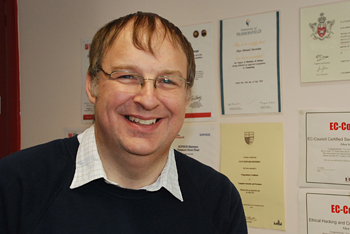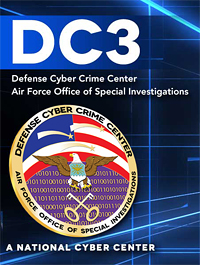Cyberman – Glyn triumphs in 2013 DC3 Digital Forensics Challenge
Fri, 20 Dec 2013 13:30:00 GMT
Hudds technician’s solo effort takes second place in a world cyber security competition
 WHEN computing and engineering students at the University of Huddersfield realise that their laptops have become infected with viruses and malware, the expert technician they ask to fix the problem is a man can give the US defence establishment a run for its money when it comes to cyber security!
WHEN computing and engineering students at the University of Huddersfield realise that their laptops have become infected with viruses and malware, the expert technician they ask to fix the problem is a man can give the US defence establishment a run for its money when it comes to cyber security!
In fact, Glyn Snowden (pictured) has been named the world’s top civilian expert in this increasingly important and demanding field. A senior technical support officer within the University’s School of Computing and Engineering, he was second only to a high-powered, highly-funded team from the US when he entered a gruelling competition named the 2013 DC3 Digital Forensics Challenge, designed by experts at the USA’s Department of Defense Cyber Crime Centre.
 The winners were a group of four entrants from the $25 billion US security and defence technology giant Northrop Grumman. But despite the resources at their disposal, they ended only a few points ahead of solo entrant Glyn, who completed a year-long series of cyber challenges using mainly open source, freeware and demo software.
The winners were a group of four entrants from the $25 billion US security and defence technology giant Northrop Grumman. But despite the resources at their disposal, they ended only a few points ahead of solo entrant Glyn, who completed a year-long series of cyber challenges using mainly open source, freeware and demo software.
His second place means that Glyn – who competed under the name Professor Snowman – beat more than 1,200 cyber enthusiasts from 49 countries. He is no stranger to competing in cyber security competitions and has entered the DC3 competition twice before, coming 11th overall in 2011 and 14th in 2012. But this year’s second place was his biggest triumph yet.
“The calibre of the other teams was extraordinarily high and it’s not yet sunk in that I was the overall civilian winner and UK winner!” he said.
The DC3 competition is designed to give entrants a taste of the demanding challenges faced by those solving cyber crime and the latest edition saw more submissions than ever. The exercises – carried out over the course of a year – required entrants to submit answers and accompanying methodologies to solve puzzles, ranging from image geo-tagging analysis, data obfuscation, password recovery, file encryption and advanced steganography.
Some exercises required candidates to develop their own custom tools, programmes and scripts.
 Glyn found that some of the relatively simple tasks – there were 40 in all – could be completed relatively quickly, but some took the equivalent of several days’ work.
Glyn found that some of the relatively simple tasks – there were 40 in all – could be completed relatively quickly, but some took the equivalent of several days’ work.
Cleckheaton-born Glyn has worked for the University of Huddersfield for over 23 years. He has a raft of qualifications in computing, including BSc and MSc degrees, many of them acquired at the University. Despite his competition track record, cyber security issues are a fairly small component of his role in the School of Computing and Engineering, although he is often called on by staff and students to restore malware-infected computers.
“I receive great satisfaction from solving the puzzles involved in analysing, recovering and identifying the artefacts in cyber security,” explained Glyn. “I’ve always been interested in cyber security and now that the internet is such a huge part of our daily lives I believe that it’s important for everyone to understand what it means to be safe online.”
 Glyn will soon acquire even greater expertise. His prize for success in the DC3 challenge is a place on a £2,000, three-day training course in Application Security Testing, run by the leading company 7Safe. He will learn more about security vulnerabilities in web applications such as web-based email and shopping websites.
Glyn will soon acquire even greater expertise. His prize for success in the DC3 challenge is a place on a £2,000, three-day training course in Application Security Testing, run by the leading company 7Safe. He will learn more about security vulnerabilities in web applications such as web-based email and shopping websites.
Glyn also plans to enter a number of cyber security challenge competitions in 2014, including the SANS NetWars Tournament, which is an against-the-clock battle against realistic simulated cyber attacks.







